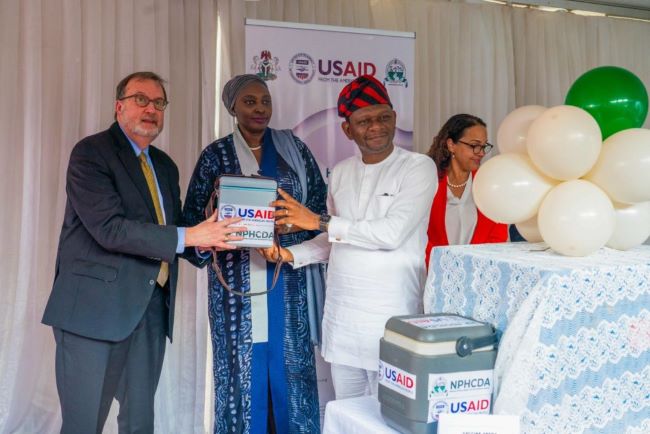Nigeria, accounting for just 1% of Africa’s confirmed mpox cases, has become the first African country to receive a vaccine shipment outside a clinical trial.
Nigeria received 10,000 doses of Jynneos, a vaccine manufactured by Bavarian Nordic and donated by the United States government.
“We are pleased to receive this modest initial donation of the mpox vaccine which is safe and efficacious,” Nigeria’s Minister of Health, Muhammad Ali Pate said. “We will continue to strengthen surveillance and be vigilant to prevent and control mpox.”
Leading up to the vaccine delivery, Dr Jean Kaseya, Director-General of the Africa CDC, confirmed that Nigeria was one of the two African countries to have issued regulatory approval for the vaccine’s introduction.
Nigeria’s preparedness, marked by a robust vaccination plan, ensured its place at the forefront of receiving these doses.
According to Africa CDC’s latest epidemic intelligence report, nearly 21,000 suspected and fewer than 3,400 confirmed mpox cases have been reported across Africa this year.
While the Democratic Republic of Congo (DRC) accounts for 95% of suspected and 90% of confirmed cases, Nigeria has only confirmed 40 cases and no deaths — a mere 1% of the continent’s total confirmed cases.
Despite this relatively low number, Nigerian public health officials have raised the alert level and strengthened outbreak preparedness.
Dr Jide Idris, the head of Nigeria’s frontline agency for disease prevention and control, the Nigeria Centre for Disease Control (NCDC), has had action-packed days since mpox was declared a public health emergency of international concern (PHEIC) – for the second time in two years.
The day after the announcement, Idris was too busy for interviews, his schedule crowded with preparations and briefings.
The atmosphere at the NCDC’s head office was intense, mirroring the urgency felt across the country as teams worked tirelessly to monitor and coordinate response to multiple outbreaks.
Meanwhile, requests for guidance on Nigeria’s mpox preparedness poured in.
“It is very busy, very busy,” he said. “We do not have Clade 1b in Nigeria. All cases are Clade 2,” Idris said.
Clade 1b is the new strain that is spreading fast in the DRC and neighbouring countries.
Idris outlined Nigeria’s three-pronged mpox response strategy: enhancing surveillance at ports of entry, boosting laboratory capacity for testing and genomic surveillance, and providing medical countermeasures (MCM) commodities.
Although mpox is currently classified as a PHEIC, the NCDC’s latest situation report for Nigeria shows a stable outlook: no surprises in case counts, no fatalities, and a consistent pattern in states reporting cases.
There has been no change in cases since 18 August 18, when the cumulative case count for 2024 stood at 40 across 19 states. Only five states reported more than two confirmed cases: Bayelsa (5), Akwa Ibom, Enugu, and Cross River (4 each), and Benue (3).
Bayelsa, which reported the third highest number of confirmed cases (45) during the 2022 outbreak and ranked second the previous year, has consistently been among the top three states for mpox cases in Nigeria over the past eight years, except in 2020.
So far in 2024, children under the age of 10 years account for 35% of confirmed cases, followed by adults aged 31 to 40 years, who make up 20%.
“Before 2024, most of the confirmed cases were in young adults aged 10-40 years, with males being predominantly affected. In 2024, however, over 33% of confirmed cases are in children aged 0-10 years,” Idris said.
According to the official announcement, the 10,000 vaccine doses will be administered in a two-dose schedule to 5,000 individuals most at risk of mpox, including close contacts of confirmed cases and frontline healthcare workers.
The vaccination exercise will primarily target the five states with recorded cases, with provisions for reactive vaccination in other states as needed.
With DRC not getting the first mpox shipment despite its central status in the outbreak, attention is on the global health players’ ability to let priority guide allocation and delivery of doses.
Gavi CEO Sania Nishtar revealed that, aside from donations from the US government and the vaccine manufacturer, DRC can also access 65,000 doses of mpox vaccine from Gavi immediately after it makes a request to Gavi.
However, Nishtar noted that the current supply of mpox vaccines will not be enough to reach everyone in Nigeria, the DRC or elsewhere that needs the shots hence the need to also bring attention to other areas, especially in the short term.
“The first response should be to boost areas such as surveillance, data collection, case management and community engagement: these important foundations are critical for helping us to understand and ultimately contain the outbreak,” Nishtar said.
Idris agrees. When asked what he thinks has uniquely positioned Nigeria to fully contain the spread of mpox without having to consider travel restrictions, he did not mention vaccine donations or any medical countermeasures.
Instead, he acknowledged Nigeria’s vast experience in responding to multiple outbreaks including more fatal ones, and the “surge capacity” it has acquired already – capacity for coordinated response mechanisms, genomic sequencing and molecular diagnosis.
This is why Nigeria is one of the very few African countries reporting cases that do not have a wide gap between suspected and confirmed cases.


